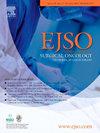比较原发性直肠癌和局部复发性直肠癌患者的健康相关生活质量的登记研究。
IF 3.5
2区 医学
Q2 ONCOLOGY
引用次数: 0
摘要
目的:国家临床登记提供了全面数据集的优势,尤其是与患者报告结果 (PRO) 数据相关联时。本研究旨在利用英国登记数据评估原发性直肠癌(PRC)和局部复发性直肠癌(LRRC)患者健康相关生活质量(HrQoL)的横断面差异:数据提取自COloRECTal癌症资料库(CORECT-R)和局部复发性直肠癌-生活质量(LRRC-QoL)数据集。使用年龄和性别两个协变量按 1:1 的比例进行倾向得分匹配。主要结果是 FACT-C 大肠癌分量表 (CCS)。统计显著性采用 p 结果:确定了一个匹配队列,每组有 72 名患者。从统计学角度看,LRRC 患者的 FACT-C CCS 总分较低(11.80 vs 18.03,p 结论:LRRC 患者的 FACT-C CCS 总分较低:从统计学和临床角度来看,LRRC 患者的 FACT-C CCS 总分都明显较差,这表明 FACT-C 能够区分这些患者群体,也表明在结直肠癌登记中纳入 PROs 的益处,特别是纳入晚期/复发性疾病患者。本文章由计算机程序翻译,如有差异,请以英文原文为准。
Registry-based study comparing health-related quality of life between patients with primary rectal cancer and locally recurrent rectal cancer
Aim
National clinical registries offer the benefits of a comprehensive dataset, particularly when linked with patient-reported outcome (PRO) data. This aim of this study was to utilise UK registry data to assess cross-sectional differences in health-related quality of life (HrQoL) in patients with primary rectal (PRC) and locally recurrent rectal cancer (LRRC).
Materials and methods
Data were extracted from the COloRECTal cancer Repository (CORECT-R) and the Locally Recurrent Rectal Cancer – Quality of Life (LRRC-QoL) datasets. Propensity score matching was undertaken in a 1:1 ratio using two covariates: age and sex. The primary outcome was the FACT-C Colorectal Cancer Subscale (CCS). Statistical significance was determined using p < 0.05 and clinical significance using effect size (ES) and minimally important clinical difference (MCID).
Results
A matched cohort with 72 patients in each group was identified. Overall FACT-C CCS scores were worse in patients with LRRC from a statistical (11.80 vs 18.03, p < 0.001) and clinically meaningful perspective (ES 1.63, MCID 6.23). Patients with PRC reported better digestion (p < 0.001, ES 0.85), better control over their bowels (p < 0.001, ES 1.03) and increased appetite (p < 0.001, ES 1.74, MCID 2.08). Patients with LRRC reported worse stomach swelling (p < 0,001, ES 0.97) and more diarrhoea (p < 0.001, ES 0.92), however they reported better body image (p < 0.001, ES 0.80).
Conclusion
Patients with LRRC reported significantly worse overall scores in the FACT-C CCS from both a statistical and clinical perspective, demonstrating the ability of the FACT-C to distinguish between these patient groups and the benefits of the inclusion of PROs within colorectal cancer registries, specifically including patients with advanced/recurrent disease.
求助全文
通过发布文献求助,成功后即可免费获取论文全文。
去求助
来源期刊

Ejso
医学-外科
CiteScore
6.40
自引率
2.60%
发文量
1148
审稿时长
41 days
期刊介绍:
JSO - European Journal of Surgical Oncology ("the Journal of Cancer Surgery") is the Official Journal of the European Society of Surgical Oncology and BASO ~ the Association for Cancer Surgery.
The EJSO aims to advance surgical oncology research and practice through the publication of original research articles, review articles, editorials, debates and correspondence.
 求助内容:
求助内容: 应助结果提醒方式:
应助结果提醒方式:


